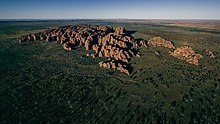Bungle Bungle Range
 From Wikipedia the free encyclopedia
From Wikipedia the free encyclopedia
This article needs additional citations for verification. (July 2019) |


The Bungle Bungle Range is a major landform and the main feature of the Purnululu National Park, situated in the Kimberley region of Western Australia.[1]
Formation
[edit]The distinctive beehive-shaped towers are made up of sandstones and conglomerates (rocks composed mainly of pebbles and boulders and cemented together by finer material). These sedimentary formations were deposited into the Red Basin 375 to 350 million years ago, when active faults altered the landscape. The combined effects of wind from the Tanami Desert and rainfall over millions of years shaped the domes.

Description
[edit]The range is found on the plains fringing the eastern Kimberley region. The ranges consist of stacks of ancient seabeds with layers of dolomite contained throughout them.[2] A 7-kilometre (4.3 mi) diameter circular topographic feature is clearly visible on satellite images of the Bungle Bungle Range.[3] It is believed that this feature is the eroded remnant of a very ancient meteorite impact crater and is known as the Piccaninny crater.
The unusual orange and dark grey banding on the conical rock formations is caused by differences in the layers of sandstone. The darker bands are on the layers of rock which hold more moisture, and are a dark algal or cyanobacteria growth. The orange coloured layers are stained with iron and manganese mineral deposits contained within the sandstone.[1]
The Bungle Bungle Range formation occupies an area of approximately 450 square kilometres (174 sq mi).[1]

History
[edit]The traditional owners of the area are the Kija/Gija people.[citation needed]
Aboriginal people have been living in the area for over 20,000 years and continue to maintain a strong connection to this ancient landscape. The national park is managed by the Western Australian Department of Environment and Conservation in conjunction with the traditional Aboriginal owners.[4][better source needed]
The range remained largely unknown except by local Aboriginal people and stockmen until 1982 when film-makers arrived and produced a documentary about the Kimberley. The area was gazetted as a National Park in 1987 and was also inscribed as a UNESCO World Heritage Site in 2003.
See also
[edit]References
[edit]- ^ a b c "Purnululu National Park" (PDF). Department of Environment. Retrieved 23 May 2015.
- ^ "Bungle Bungles". Australia: The Land Where Time Began. Australia through time. Retrieved 28 September 2017.
- ^ https://maps.google.com/maps?q=Australia&ie=UTF8&om=1&z=12&ll=-17.421408,128.444939&spn=0.128409,0.342636&t=k Google Maps image
- ^ "History and Geology". Kimberley Australia Guide. Retrieved 23 May 2015.
External links
[edit]- Purnululu National Park
- Bungle Bungle Range (Purnululu National Park) "Information Site" including all relevant history, Photos and information about the local area...Kununurra, Halls Creek and surrounds